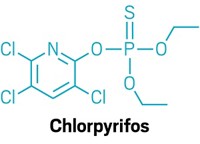Advertisement
Grab your lab coat. Let's get started
Welcome!
Welcome!
Create an account below to get 6 C&EN articles per month, receive newsletters and more - all free.
It seems this is your first time logging in online. Please enter the following information to continue.
As an ACS member you automatically get access to this site. All we need is few more details to create your reading experience.
Not you? Sign in with a different account.
Not you? Sign in with a different account.
ERROR 1
ERROR 1
ERROR 2
ERROR 2
ERROR 2
ERROR 2
ERROR 2
Password and Confirm password must match.
If you have an ACS member number, please enter it here so we can link this account to your membership. (optional)
ERROR 2
ACS values your privacy. By submitting your information, you are gaining access to C&EN and subscribing to our weekly newsletter. We use the information you provide to make your reading experience better, and we will never sell your data to third party members.
Pesticides
EPA allows novel RNAi pesticide for 3 years
Gene-silencing technology approved to fight Colorado potato beetle
by Britt E. Erickson
January 3, 2024
| A version of this story appeared in
Volume 102, Issue 1

The US Environmental Protection Agency has approved the use of a sprayable biopesticide that relies on RNA interference (RNAi) to combat the destructive Colorado potato beetle. The pesticide’s active ingredient, ledprona, consists of double-stranded RNA (dsRNA). The product is the first dsRNA pesticide in the world allowed to be sprayed on plants, according to the EPA.
Ledprona works by turning off a gene the Colorado potato beetle needs to produce a protein that is critical for its survival. The Massachusetts-based biotech firm GreenLight Biosciences, which makes the product, claims it specifically targets the Colorado potato beetle and is not harmful to other insects. The pesticide also breaks down rapidly in the environment, the company says.
The EPA plans to reevaluate the product after 3 years. The limited time frame “is consistent with EPA’s approach to other novel biopesticide products,” the agency says.
Environmental groups are sounding the alarm over potential unintended consequences of the novel technology on bees and other pollinators. “We are highly concerned about the use of this product and believe there to be insufficient research to ensure adequate protection of pollinators,” the Pollinator Stewardship Council says in comments submitted Oct. 14 to the EPA. The council warns that effects on nontarget species could expand beyond pollinators to entire populations and ecosystems.





Join the conversation
Contact the reporter
Submit a Letter to the Editor for publication
Engage with us on Twitter